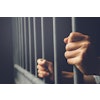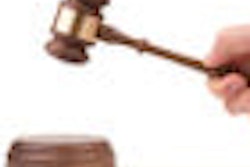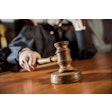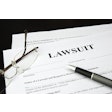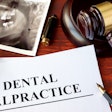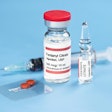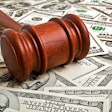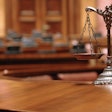
A Pennsylvania malpractice suit involving an oral surgeon's patient who suffered a massive stroke following multiple tooth extractions is expected to go to trial after testimony from two expert witnesses was deemed admissible by a federal judge.
Christopher Ellison, 49 at the time, had a history of hypertension, hyperlipidemia, smoking, diabetes, and obesity when he arrived at the Philadelphia Veterans Affairs (VA) Medical Center on September 11, 2007, to have eight teeth removed. The procedure was performed by Mark Abel, DMD, and dental assistant Christine Bender, a student at the time (she is now a dentist), as part of a treatment plan for Ellison's periodontal disease. Both testified that Ellison appeared anxious prior to the surgery.
Around 9 a.m. the procedure began with local anesthetic injections but progress was halted after the fifth due to the patient's nausea and heavy perspiration. Using a blood pressure cuff, a reading of "70s over 40s" was taken, according to court documents. Ellison was reclined, given a damp cloth for his forehead, and "within a minute" his blood pressure had returned to 100-110s/70s. Within 15 minutes, Ellison stated that he was "fine to continue."
Fifteen to 20 more injections were administered while Ellison sat upright, but then he experienced another drop in pressure, to the 50s/20s range. After reclining, he "rebounded quickly" and said he was ready to proceed. But Dr. Abel had to halt the procedure twice more due to the patient feeling nauseated and having a blood pressure reading of 60/30. After the last tooth was extracted, Ellison was reclined and observed for about 15 to 20 minutes in total.
Ellison "was moving his arms and legs and looked fine" when he departed around 10:30 a.m. for the medical campus' pharmacy, where it took him about an hour to fill a prescription. He was found in his vehicle a short distance from the hospital at 1:22 p.m. by emergency responders. He was subsequently diagnosed as having suffered a left middle cerebral artery stroke that required extensive hospitalization and rehabilitation, and left him with significant brain damage, according to court documents.
Lawsuit alleges malpractice
In December 2008, Ellison's wife, Cheryl, filed a complaint against Dr. Abel, Dr. Bender, and the VA hospital, alleging malpractice. The U.S. government was named as the defendant as a result of the hospital's and doctors' association with the VA.
The government subsequently filed a motion for summary judgment seeking to exclude the plaintiff's expert witnesses from testifying in the malpractice case. The defendants argued that the testimony from two witnesses should be excluded on the basis that their opinions are "unreliable." Without their testimony, the defendants argued, the plaintiff would be unable to meet her burden to prove causation.
The witnesses at issue were Stuart Super, DMD, an oral and maxillofacial surgeon for 38 years who received his doctor of dental medicine degree from Harvard University, and Scott Kasner, MD, the neurologist and the director of the hospital's Comprehensive Stroke Center who treated Ellison at the emergency department of the Hospital of the University of Pennsylvania.
The government argued that Dr. Super's opinions do not represent the generally accepted standard of care among oral surgeons because he conceded at his deposition that he had no way of knowing whether a significant number of oral surgeons would disagree with him. It also argued that he was unable to cite medical literature supporting his opinions about the appropriate standard of care.
The government also questioned Dr. Kasner's suitability based upon the conclusions he'd drawn about the stroke because he did not use the standardized method for stroke classification or test for arteriosclerosis.
Motions dismissed
But last month, Senior U.S. District Judge William Yohn Jr. of the U.S. District Court for the Eastern District of Pennsylvania dismissed the government's motions, ruling that the witness' opinions were "based on reliable methodology and reliably flows from that methodology and the facts at hand."
Dr. Super, who served as an examiner and a section leader for the American Board of Oral and Maxillofacial Surgery, believed that there was a significant deviation from the standard of care due to the patient's health history and lack of fluctuations during an earlier visit when he had three teeth extracted, according to Yohn's 38-page summary judgment opinion, issued November 10.
"He explained that, over the years, he has stopped a dental procedure more than 100 times because the patient experienced synocope or presyncope & in all those cases the patient was over 40 with a 'significant' medical history,' " Yohn wrote.
The judge also supported Dr. Kasner's opinion, stating that he sufficiently explored the cause of the stroke with a "differential diagnosis-type process," which has previously been recognized by the court as a reliable methodology. "The government does not offer any basis to find unreliable Dr. Kasner's testimony," Yohn concluded.
Dr. Kasner wrote in his report that the stroke could have been avoided or its effects made less severe if the patient had been kept for observation.
When contacted by DrBicuspid.com, Assistant U.S. Attorney Thomas F. Johnson and Charles L. Becker, who represents the plaintiff along with Shanin Specter and Regan Safier of Kline & Specter, declined to comment due to the ongoing nature of the case.
Copyright © 2010 DrBicuspid.com


